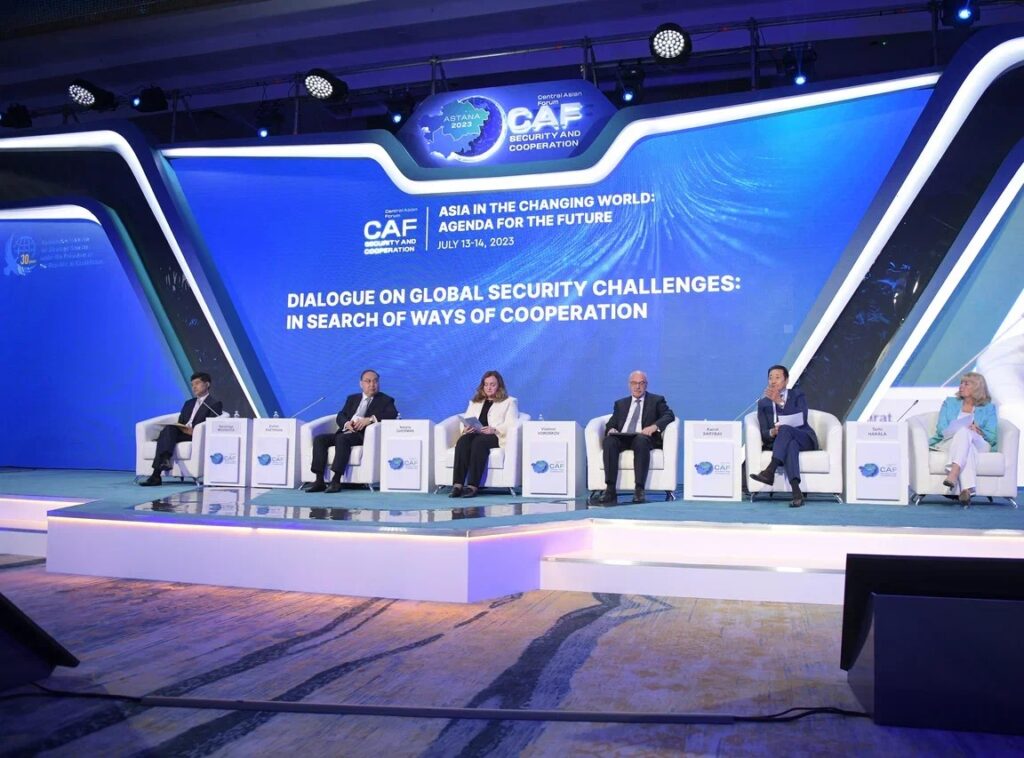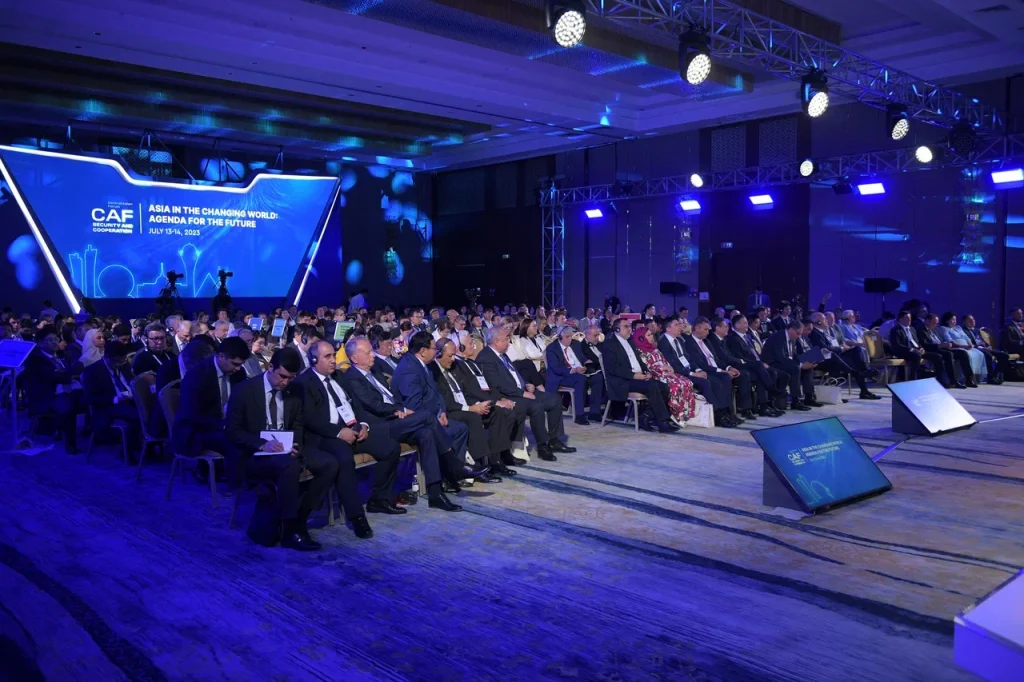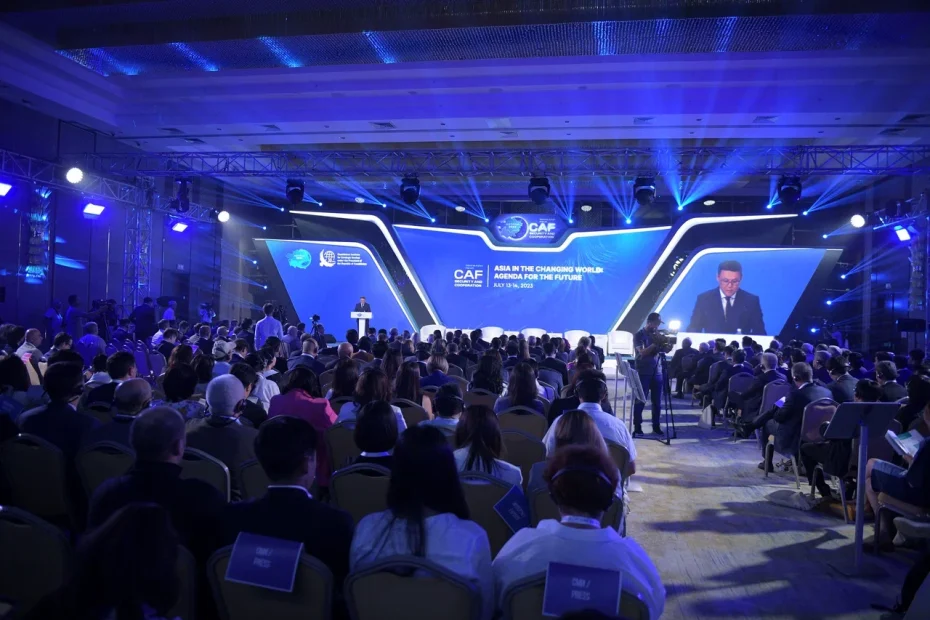The first day of the two-day Central Asian Security and Cooperation Forum on “Asia in the Changing World: Agenda for the Future” has come to an end.
A new dialogue platform on cooperation in Central Asia, bringing together experts from the world’s leading think tanks, was created through the joint efforts of the Kazakhstan Institute for Strategic Studies under the President of the Republic of Kazakhstan and the Ministry of Foreign Affairs of Kazakhstan.
The event was inaugurated by Yerkin Tukumov, Director of the Kazakhstan Institute for Strategic Studies under the President of the Republic of Kazakhstan. In his speech, he noted the rapid economic and technological progress of Asia, the growing geopolitical importance of Asia in the world and the importance of the forum in the current realities.

Murat Nurtleu, Deputy Prime Minister and Minister of Foreign Affairs of the Republic of Kazakhstan, read out the welcoming speech of the President of the Republic of Kazakhstan Kassym-Jomart Tokayev to the participants of the forum.
Then, speaking on his own behalf, the Foreign Minister of Kazakhstan noted that the transformation and democratization of society, as well as the competitiveness and sustainability of the country’s economy are vital to our success and the success of Central Asia: “We advocate close cooperation in the areas of security, trade, investment, transport, logistics, energy, industrialization, technological development, water management, ecology, culture and education. We propose to create a regional hub for sustainable development of Central Asia in Almaty. This year Kazakhstan assumed the chairmanship of the SCO. We aim to expand and strengthen economic and trade relations, promote closer cooperation in the energy sector and environmental protection, expand cooperation in the digital sphere and deepen cultural and humanitarian ties”.

Erzhan Kazykhan, Deputy Chief of Staff of the President of the Republic of Kazakhstan, Special Representative of the President for International Cooperation, speaking about the foreign policy of our country, emphasized the Astana process for the peaceful settlement of the Syrian crisis. In addition, he noted the country’s active position on humanitarian aid to Afghanistan: “We seek to actively participate in activities to prevent the growing humanitarian danger and consider it strategically important to open a UN center for assistance to Afghanistan”.
Meanwhile, attention from international organizations has become an important component of the General Session. Thus, Vladimir Voronkov, Under-Secretary-General of the United Nations Counter-Terrorism Office, said: “Central Asian countries have made tremendous progress over the past twenty years in strengthening their regional cooperation and collaboration with international partners to develop their economies and societies and address common challenges, including terrorism. The United Nations is grateful for these efforts, and you can count on our continued support for peace, shared prosperity and human rights.”
Natalia Gherman, Assistant Secretary-General and Executive Director of the United Nations Counter-Terrorism Committee Executive Directorate (CTED), highlighted Operation Zhusan: “Kazakhstan was the first in the region to respond to this call and showed leadership in returning its citizens from conflict zones, especially women and children. Other Central Asian states followed suit. Central Asian states continue to demonstrate strong political will to work together to combat terrorism at the regional level.”
Kairat Sarybay, Secretary General of CICA, spoke about the importance of medium and small countries. According to him, the dismantling of the bipolar world has dramatically increased the potential of medium and small countries, which have realized that they can play a prominent role in global and regional affairs if they join forces. Today, this process can be observed across the globe, but it is in Asia that it is most visible.
Terhi Hakala, EU Special Representative for Central Asia, gave her assessment of the region’s development: “Looking at Central Asia, we see positive regional efforts to jointly address regional issues, while many international security challenges are also felt in the region. As one example of regional cooperation, Kazakhstan is actively expanding cooperation with neighboring countries and countries across the Caspian Sea to intensify work on the Trans-Caspian Corridor.”
The experts agreed that for the successful implementation of the plans and projects it is necessary to ensure the involvement of both political, expert and civil society. On July 14, the discussions at the Forum will continue.



